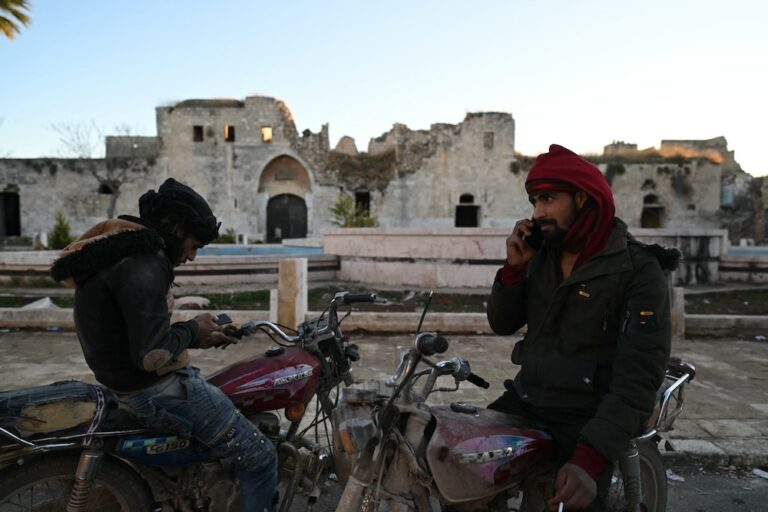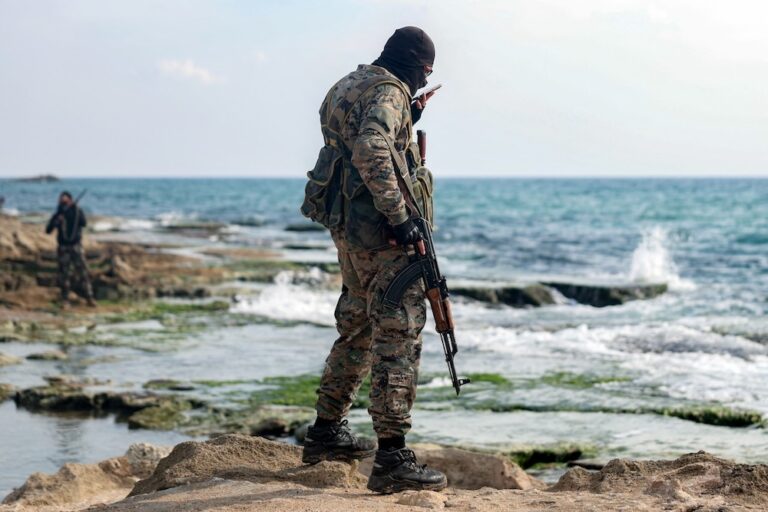(RSF/IFEX) – Nizar Nayyouf, the 43-year old Editor-In-Chief of the monthly “Le vote de la Démocratie”, sentenced in 1992 to ten years of forced labour, has, for the last several months, been suffering from Hodgkin’s disease (leukaemia), which is a curable form of cancer if it is treated with chemotherapy in its early stages. According […]
(RSF/IFEX) – Nizar Nayyouf, the 43-year old Editor-In-Chief of the monthly
“Le vote de la Démocratie”, sentenced in 1992 to ten years of forced labour,
has, for the last several months, been suffering from Hodgkin’s disease
(leukaemia), which is a curable form of cancer if it is treated with
chemotherapy in its early stages. According to RSF, military authorities
holding Nayyouf have clearly indicated to him that he will receive treatment
only on the condition that he sign a statement acknowledging that he “made
false declarations concerning the situation of human rights in Syria” and
that he agrees to abandon all political activity.
**Updates IFEX alert of 10 November 1995**
Moreover, Nayyouf suffers from numerous effects stemming from the conditions
in which he has been detained and the torture he has undergone: he is
paralysed in his lower limbs due to fractured vertebrae following the
so-called “German chair” method of torture in which the limbs are pulled,
hyper-extending the spine and and causing tension on the neck and limbs, and
from being suspended by his feet as well as from being struck numerous times
with an iron bar. Following a fracture to the occiput (back of the head), he
has been progressively losing his sight. He suffers as well from dermatitis
due to burns from cigarettes that healed badly, and stomach haemorrhaging
brought on by his numerous hunger strikes and food soiled with the urine of
his jailers. The conditions of his detention are particularly inhumane: he
is locked up in a 2.5 by 3 meter cell and has not seen the sun for six
years. As a result of his paralysis, he must crawl on the floor of his cell
to go to the toilet and to wash (in cold water.) “Nizar Nayyouf’s life is in
danger. Damascus authorities must immediately release him so that he can be
hospitalized. It is no longer only a question of freedom of the press but a
question of life or death, an urgent humanitarian case. The illness must not
become a new instrument of torture in the hands of the torturers,” said
Robert Ménard, Secretary General of RSF.
Nayyouf, who is also the Secretary-General and spokesperson for the human
rights organization the Committee for the Defence of Democratic Freedom in
Syria (CDF), was arrested on 10 January 1992. He surrendered after
twenty-two days during which time his wife and daughter were detained in his
place. He was sentenced by a military court on 17 March 1992 to ten years
forced labour. His state of health puts him at risk of not surviving to see
the day he will be freed, which is expected to take place during 2002. He
spent ten months in the prison at Saydnaya, in the suburbs of Damascus (the
capital city), and on 6 February 1993, he was transferred to the military
prison in Palmyre, in the Syrian desert, where the conditions are
particularly difficult (the weather is extremely hot in summer and cold in
winter.) The transfer was a punitive measure following Nayyouf’s attempt to
organise a rebellion of those detained in Saydnaya prison. In July 1993, he
began a hunger strike which lasted thirteen days and left him very weak.
After having succeeded in smuggling out evidence of torture and murder
practiced at Palmyre (numerous prisoners die under torture,) he was again
transferred, this time to the military prison of Mezze, in Damascus.
Considering the seriousness of Nayyouf’s illness, and the conditions under
which he is detained, RSF asks the Syrian authorities to free the journalist
immediately for humanitarian reasons and allow him to receive appropriate
medical treatment which may save his life.
Nine other journalists remain in detention in Syria for press crimes, and
RSF demands their immediate release.


